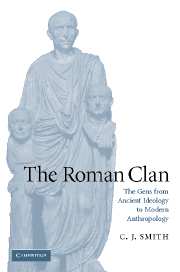Book contents
- Frontmatter
- Contents
- List of illustrations
- Preface
- List of abbreviations
- General introduction
- Part I THE EVIDENCE FOR THE GENS
- Chapter 1 The ancient evidence
- Chapter 2 Modern interpretations
- Chapter 3 The gens in the mirror: Roman gens and Attic genos
- Chapter 4 Archaeology and the gens
- Part I: Conclusion
- Part II TOWARDS AN INTERPRETATION OF THE GENS
- Appendix 1 Dionysius of Halicarnassus on the Roman curiae and religion
- Appendix 2 The missing curiae
- Select bibliography
- General index
- Index of ancient persons
- Index of passages discussed
Chapter 1 - The ancient evidence
Published online by Cambridge University Press: 22 September 2009
- Frontmatter
- Contents
- List of illustrations
- Preface
- List of abbreviations
- General introduction
- Part I THE EVIDENCE FOR THE GENS
- Chapter 1 The ancient evidence
- Chapter 2 Modern interpretations
- Chapter 3 The gens in the mirror: Roman gens and Attic genos
- Chapter 4 Archaeology and the gens
- Part I: Conclusion
- Part II TOWARDS AN INTERPRETATION OF THE GENS
- Appendix 1 Dionysius of Halicarnassus on the Roman curiae and religion
- Appendix 2 The missing curiae
- Select bibliography
- General index
- Index of ancient persons
- Index of passages discussed
Summary
INTRODUCTION
We have significant evidence for the nature and history of the gens but, as so often for social institutions which are obvious to those who live with them, but obscure to those who come after, our information is scattered in time and disparate in character. Much is missing that might have helped; the wreckage of Varro's abundant work is particularly unfortunate for our understanding of early Rome. From what we know, Varro was both knowledgeable about the traditions of early Rome, and interested in many of the questions which we will have to address. However, there is no reason to suppose that even if all that the ancients wrote was restored to us, we would have an account that was accurate and cogent. The idea that the gens had a single form which even ideally might be recovered is one which this book explicitly rejects. As we shall see, the evidence suggests that the gens was not an institution which stood still, and that it was part of an argument, an argument which was conducted with some passion on a number of fronts over a long period of time. Our task must be to recover the lineaments of the argument, without the expectation that putting them together will reveal even a half-complete jigsaw of a single picture.
- Type
- Chapter
- Information
- The Roman ClanThe Gens from Ancient Ideology to Modern Anthropology, pp. 12 - 64Publisher: Cambridge University PressPrint publication year: 2006

